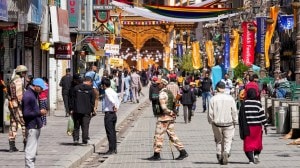They are no longer part of the jet set
Just last year, Gen. Romeo Lucas García’s quiet death in exile in Venezuela caught the attention of few people outside Guatemala...

Just last year, Gen. Romeo Lucas García’s quiet death in exile in Venezuela caught the attention of few people outside Guatemala, where he had presided over a ruthless period of civil war in which 37 people were burned to death during a siege at Spain’s embassy. Spain tried to extradite him in 2005 on human rights charges, but had gotten nowhere.
A tranquil death in a foreign land, at the age of 81: such a bookend to a life of brutality or corruption was long guaranteed for Latin America’s exiled strongmen.
Until now. The tradition of guaranteed asylum for fallen leaders is, in fact, coming under siege throughout the region, and the surprising extradition of Alberto K. Fujimori last month to Peru from Chile could be a turning point.
Argentina, Bolivia, Ecuador, Haiti and Venezuela are all discussing ways of bringing former leaders out of exile to face human rights or corruption charges, and legal experts expect these various efforts to be energised by a ruling by Chile’s Supreme Court ordering that Fujimori be sent to a jail cell in Peru to await trial.
“There has always been tension between the pursuit of justice and realpolitik in extradition cases, but now it gradually feels like justice is gaining ground,” said M. Cherif Bassiouni, an expert on extradition at the DePaul University College of Law in Chicago.
The Fujimori ruling dovetails with a brand of legal theory that gained force in the 1990s with a British ruling that put Gen. Augusto Pinochet of Chile under house arrest there pending extradition to Spain. He was visiting Britain, rather than in exile there, having stepped down as dictator with an understanding that he wouldn’t be prosecuted in Chile.
But Britain’s House of Lords decided he could nevertheless be tried in Spain to face torture charges when Spain sought him.
General Pinochet eventually won the right to be returned home to Chile — where, in a new political environment, he lived out his remaining years fighting to stay out of jail. He died in Chile last December, yet last week his family was brought under a legal cloud, accused of living off money he had secreted abroad while in office.
Meanwhile, international courts had begun extraditing leaders like Jean Kambanda of Rwanda and Slobodan Milosevic of Serbia to face international tribunals on genocide-related charges; these actions established clear precedents that some atrocities against civilians offended not just the laws of a country, but also international standards of human rights.
Yet these precedents also encouraged governments to insist that their former leaders accused of despotism or thievery be returned for trial, and made other countries reluctant to keep rewarding these disgraced leaders with a comfortable life.
“Slowly and unevenly, but indubitably, the region’s judiciaries have become more professional,” said Cynthia McClintock, a Latin America specialist at George Washington University.
The change in atmosphere is hitting Latin America with particular force, because the right of political asylum for former heads of state in the region was once viewed as sacred — a kind of institutional understanding that underlay the cycle of coups and countercoups, dictatorships and rebellions.
In practice, it often played out like this: a caudillo, or strongman, amassed such power or abused opponents to such an extent that he was threatened with rebellion or overthrown. At that point, he made his escape abroad by airplane or boat, or by limousine onto the grounds of a friendly embassy whose government, by law or tradition, was prone to accept its new guest automatically.
More often than not, it seemed, the United States intervened, either quietly or publicly. Its officials would broker a deal that would deliver the ousted ruler with a minimum of upheaval to his country of exile. And as in the past, extradition sometimes hews closely to US interests.



- 01
- 02
- 03
- 04
- 05



























